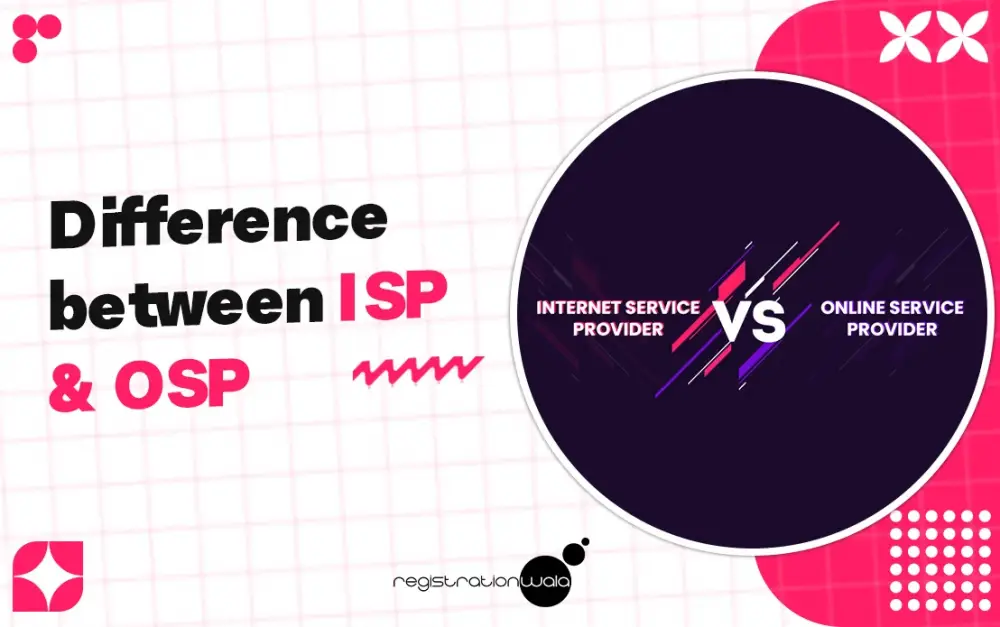Difference between ISP & OSP
- April 20, 2024
- Registrationwala

- Home
- /
- Knowledge Base
- /
- News & other businesses
- /
- Blog
- /
- Difference between ISP & OSP
Difference between ISP & OSP
Many people tend to get confused between the terms ‘ISP’ and ‘OSP’. Moreover, both ISP and OSP are a part of the same industry i.e., the telecommunication industry. In this article, we will discuss the differences between ISP & OSP and help you to clear your doubts regarding them.
What is an Internet Service Provider (ISP)?
As the name suggests, Internet Service Providers (ISPs) are organizations that connect people to the internet. This type of company operates much like traditional phone companies, offering different kinds of plans and pricing structures depending on how many connections you want and the type of bandwidth required by you. ISP is also known as Internet Access Provider. The provisions related to the ISPs are specifically legislated in the Information Technology Act, 2000. In order to start a company as an ISP, having a DoT-issued ISP license is mandatory.
ISPs have telecommunication lines and associated equipment so that they can provide services in the geographic areas of their jurisdictions. Along with the internet, ISPs provide their customers with e-mail, web hosting and domain registration. ISPs provide various types of internet connections such as cable, fiber and wireless connections.
For the purpose of providing services to the customers, ISPs are linked to a single or multiple high-speed line(s). The major ISPs maintain their own high-speed lines which allow them to offer better services to their customers. Such ISPs are not fully dependent on the telecommunication services. ISPs also maintain servers in data centers to control their customer traffic.
Three Tiers of ISPs
The ISPs have been categorized into three tiers viz. Tier 1, Tier 2 and Tier 3.
- Tier 1 ISPs: These types of ISP manage most of the traffic by themselves since they possess enough physical network lines. As a result, they have the maximum global reach. They negotiate with other Tier 1 networks so that the traffic can be passed to other Tier 1 providers.
- Tier 2 ISPs: These ISPs are service providers which connect the ISPs belonging to Tier 1 and Tier 3. They possess regional as well as national reach. They generally have commercial and consumer customers.
- Tier 3 ISPs: These ISPs connect their customers to the internet with the help of another ISP’s network. They have to pay the higher tier ISPs in order to avail their internet-related services. Their objective is to offer internet services to local businesses as well as the consumer markets.
Different types of ISP connections
A range of technologies are used by ISPs for enabling customers’ connection to their network. Let’s take a look at the most common types of internet connections:
- DSL (digital subscriber line)
- Cable broadband
- Wireless broadband
- Satellite and mobile broadband
- Dedicated leased line
- Fiber optic broadband
Now let’s understand what an OSP is.
What is an Other Service Provider (OSP)?
In 1999, New Telecom Policy was introduced by the Government of India with the aim of regulating the telecom sector and improving the infrastructure. Under the new policy, regulations for Other Service Providers (OSPs) were introduced. Then in 2000 in the month of February, terms and conditions for OSPs were introduced and then in 2008, they were revised. After this, they were further revised through amendments as and when required.
An OSP is an Indian company, registered under the Companies Act, 2013 or Limited Liability Partnership (LLP) registered under LLP Act, 2008 or a Partnership firm/organization registered under Shops and Establishment Act, 1954 or a Legal Person providing voice based Business Process Outsourcing (BPO) services.
An OSP provides various kinds of services that are related to the telecommunications, such as tele-education, tele-trading, e-commerce, telemedicine, telebanking, call centers, network operation centers and other IT-enabled services by efficiently using the telecom resources providers by authorized services providers. The telecom resources refer to the telecom facilities used by the OSP to provide services. These resources include:
- PSTN (Public Switched Telecom Network)
- PLMN (Public Land Mobile Network)
- ISDN (Integrated Services Digital Network)
- Telecom bandwidth
OSPs can utilize the telecom resources which are provided by the authorized telecom services providers only. The OSPs are not allowed to infringe on the jurisdiction of authorized telecom service. To utilize the application services, OSPs need to get registered by the Department of Telecommunication.
Types of OSPs
Mentioned below are the factors for determining the types of OSPs:
- The number of workers in the organization
- The network area to which this service has to be provided
In accordance with the factors mentioned above, there are 3 types of OSPs that exist:
- Domestic OSPs: These OSPs provide application services within the Indian territory.
- International OSPs: These OSPs provide application services outside the boundaries of the Indian territory.
- Hot Sites: These are standby OSP centers which are used in times of disaster or an emergency situation only.
It is important to note that International OSPs and domestic OSPs cannot be interconnected. In addition to this, an OSP is required to seek internet connectivity from an authorized ISP.
Conclusion
It is necessary to understand the difference between ISPs and OSPs to have a better understanding about the functioning of the telecommunication industry. Both of them differ in their roles, but are equally important in the world of digitalization. OSPs offer voice-based Business Process Outsourcing (BPO) services. Whereas, ISPs provide internet access to people. If you want to obtain a DoT-issued ISP license, connect with ISP License Consultants at Registrationwala for assistance!
- 1798 views
